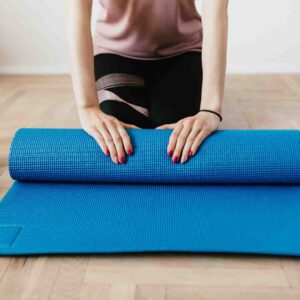Table of Contents
Introduction
Consistent Pilates Benefits
Pilates Results: How Many Sessions?
How to Measure Pilates Practise Success
Q&A
Conclusion
Tagline: "Transform your body in just a few weeks with Pilates."
Introduction
Pilates improves core strength, flexibility, and body alignment. Many question how long Pilates takes to work. The answer depends on the person's fitness level, diet, and training frequency and intensity. Strength, flexibility, and postural improvements usually take weeks to months. Consistent practise and dedication can lead to long-term health benefits and a healthy physique.
Consistent Pilates Benefits
Pilates has been popular for over a century. Joseph Pilates developed it, believing physical and mental health were linked. Pilates is a low-impact workout that builds core strength, flexibility, and body awareness. Pilates results are often questioned. This depends on the person's fitness, practise frequency, and goals.
Pilates improves posture. Pilates strengthens spine-supporting muscles to relieve back pain and improve posture. However, meaningful postural gains take time and practise. Pilates, together with stretching and standing up straight, helps improve posture over time.
Pilates improves flexibility. Pilates stretches and lengthens muscles, improving flexibility and range of motion. Like posture, flexibility improves over time with practise. Over time, frequent Pilates practise, stretching, and activity can increase flexibility.
Pilates also improves strength. Pilates helps build core strength and stability. Strength improvements, like posture and flexibility, take time and practise. Over time, consistent Pilates practise, strength training, and activity can enhance strength.
Pilates has physical, mental, and emotional benefits. Pilates needs concentration and mindfulness. It reduces stress, improves mood, and boosts well-being. Like physical health, mental and emotional health improves over time with practise. Over time, consistent Pilates practise, meditation, and self-care can improve mental and emotional wellness.
Pilates works how long? This depends on the person's fitness, practise frequency, and goals. However, continuous Pilates practise can enhance posture, flexibility, strength, and overall well-being. Pilates should be a long-term practise, not a fast fix. You can reap the benefits of Pilates by practising regularly and adopting other healthy habits.
Pilates Results: How Many Sessions?
Pilates has been popular for over a century. This low-impact workout strengthens core muscles, improves flexibility, and raises body awareness. Pilates helps patients with posture, back problems, and toning. How long does Pilates work?
This question has several variables. First, fitness and objectives matter. New exercisers may see effects faster than veterans. Weight loss may require more Pilates lessons than muscular tone.
Frequency impacts how long Pilates takes to work. Pilates demands regularity. To notice improvements, practise Pilates two to three times a week. Some may need additional sessions to see improvements.
Results depend on the Pilates class. Mat, reformer, and prop Pilates classes exist. Each lesson targets different body parts and yields varied effects. Reformer Pilates uses resistance to improve strength faster than mat Pilates.
Commitment to Pilates also impacts results. Pilates takes time and dedication. Body changes may take weeks or months. Pilates may have long-term benefits for people who do it regularly.
How many Pilates sessions are needed for results? After ten sessions, most people notice physical changes. Posture, flexibility, and core strength may improve. However, everyone's body is different, so some may notice benefits faster than others.
Pilates goes beyond bodily changes. Pilates relaxes many people. Pilates emphasises breathing and mindfulness, which reduce anxiety and enhance mental wellness.
In conclusion, Pilates' effectiveness depends on the individual's fitness level, goals, frequency of sessions, type of class, and commitment. Most people experience changes within ten sessions, while some take longer. Those who stay with Pilates and make it part of their regimen may achieve long-term physical and emotional advantages.
How to Measure Pilates Practise Success
Pilates has been popular for over a century. This low-impact workout strengthens core muscles, improves flexibility, and raises body awareness. Pilates helps patients with posture, back problems, and toning. How long does Pilates work?
This question has several variables. First, your fitness level and Pilates frequency matter. If you're new to Pilates and sedentary, it may take longer to notice improvements than if you're active and practise consistently. If you simply practise Pilates once a week, results may take longer than if you practise three to four times a week.
Workout intensity also determines how long Pilates takes. The more difficult the Pilates workout, the faster the results. However, listening to your body and not pushing too hard helps prevent harm.
Pilates type might also effect results. Pilates is either mat or equipment-based. Equipment-based Pilates uses the Reformer, Cadillac, and Wunda Chair, whereas mat Pilates uses a mat. Equipment-based Pilates is harder and yields results faster than mat Pilates.
How can you evaluate your Pilates practise? Track your progress. Keep a fitness journal to record your routines, repetitions, and adjustments. Before and after Pilates images can show body shape and posture modifications.
Pay attention to how your body feels to evaluate your Pilates practise. Pilates improves body awareness, posture, flexibility, and strength. Back and other aches may also decrease.
Pilates takes time to work. Regular practise and devotion will improve your body and health. Be realistic and don't compare yourself to others. Progress varies by body type.
In conclusion, how long Pilates takes depends on your fitness level, workout intensity, and style of Pilates. Track your progress, listen to your body, and set reasonable goals to evaluate your Pilates practise. Your body and health will improve with consistent practise.

Q&A
1. How long do Pilates effects take?
Pilates results usually take 10-12 sessions.
2. How often should I perform Pilates for results?
For benefits, do Pilates 2-3 times a week.
3. What benefits would Pilates provide?
Pilates improves core strength, flexibility, posture, balance, and body awareness. It reduces back discomfort and boosts sports performance.
Conclusion
Depending on frequency, intensity, fitness level, and body composition, Pilates can take weeks or months to show effects. Pilates improves posture, flexibility, strength, and body awareness when practised consistently.


